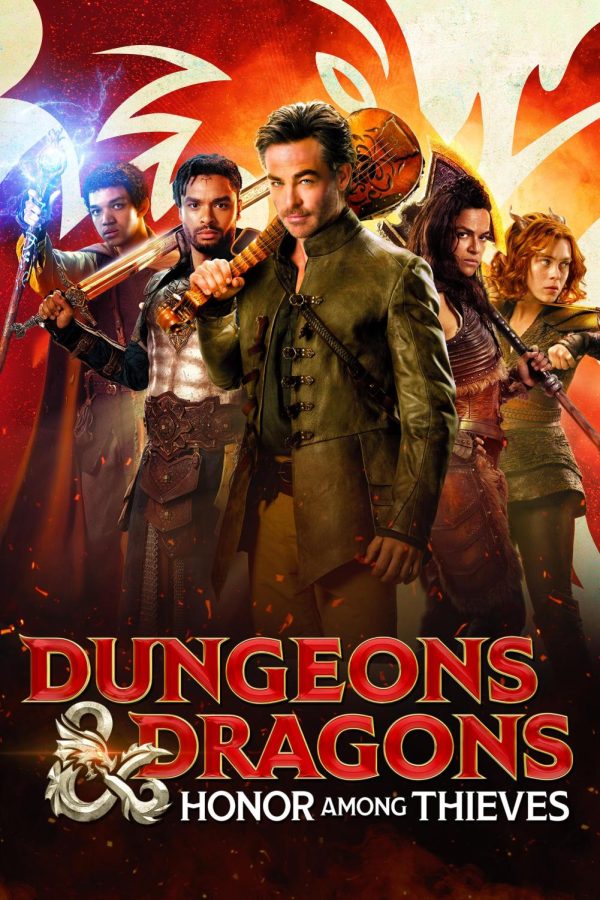Dungeons and Dragons Review
Dungeons and Dragons: Honor Among Thieves features a star studded cast led by Chris Pine and Michelle Rodriguez
May 25, 2023
Dungeons and Dragons: Honor Among Thieves is, to use the technical term, not very good. The emotional core of the film is weak, the characters are thin, and the plot could probably write itself if you left a typewriter alone for long enough. That’s not to say it’s all bad, it’s fun, it’s entertaining, the performances are all solid, the comedy isn’t awful, though it could certainly be better, the effects (especially the practical ones) are pretty impressive, and overall; it’s a perfectly passable, if not exceedingly bland action-comedy.
Many of the film’s issues stem from its complicated relationship with its source material. Dungeons and Dragons has been around since the 1970s and since then, the game has become a mainstay of pop-culture, basically guaranteeing an appearance in any story set in the ‘80s. With how popular the game is, it seems almost inevitable that it would receive a film adaptation.
The problem, however, is that Dungeons and Dragons doesn’t lend itself particularly well to a big-screen adaptation, primarily because D&D doesn’t really have anything to adapt. Dungeons and Dragons isn’t scripted, the plot is determined by the players themselves, who assume the roles of each character within the game and make decisions that shape the story.
Honor Among Thieves, of course, is scripted, the characters in the movie are not being controlled by real people, making decisions in real time. Their struggles, the challenges they face, and the outcomes of their stories have already been decided before the film even begins. It’s impossible to adapt the actual experience of playing the game.
So given that Honor Among Thieves is an original story that is simply set within the world of Dungeons and Dragons and can never hope to be an actual adaptation of the game, does it at least leverage its unique setting to make the story it’s telling more interesting? In other words: does it do anything to stand out from the crowd? Well no, not really, and it’s not trying to, they were obviously going for the same mass-market appeal as a Marvel movie. As such, it’s full of the same Joss Wheden-esque witty dialogue, and low-stakes action that allows the film to slide smoothly into the PG-13 rating, and a plot that never takes itself too seriously. And, to the films credit, they did it; Honor Among Thieves is essentially a Marvel movie with a fantasy theme superimposed on top, with admittedly better practical effects, shot composition, and action choreography than the majority of films in the MCU.
Given all this you may be wondering, why make this a Dungeons and Dragons film at all? If you’re already telling an original story and you’re not doing anything with the source material beyond a few tongue-and-cheek references, why not just make your own world that fits better with the story you’re trying to tell, you know, kinda like a game of D&D.
The answer is simple: To Paramount, Honor Among Thieves doesn’t matter. To the executives and shareholders running the company, the film does not exist as a film, to them it’s merely a data point, a figure on a quarterly sales report, a stepping stone to future merchandising opportunities. Even before the film was released Paramount+ and Hasbro had already ordered the production of an eight episode, live-action series set in the world of Dungeons and Dragons, evidently trying to copy the format of shows produced by Netflix and Disney+. Honor Among Thieves was outdated even before it came out.
These days it seems like every movie has to be part of a franchise, a sequel, a remake, a reboot, a link in a never ending chain where each movie, each limited series, or tie-in novel exists only to set up the next thing, the next link in the chain. This system is not inherently bad, nor does it make it impossible for good movies to be made. There will always be good stories to tell, and good people to tell them, but this system, this focus on the chain rather than the individual links makes it very difficult for those people, and their stories, to make it through unscathed.






